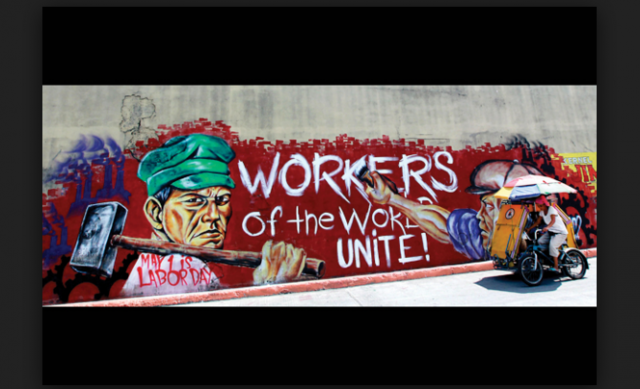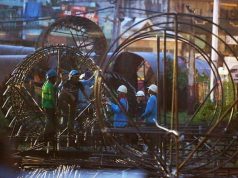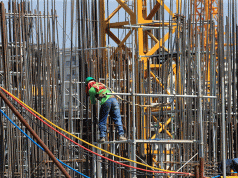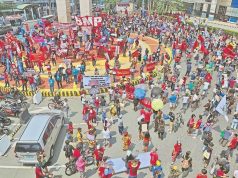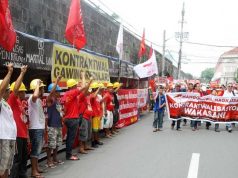(FIRST POSTED – 8:41 a.m./UPDATED – 11:30 a.m.) MANILA, Philippines – While the Department of Labor (DOLE) announced during Labor Day that it was making progress in its efforts to end job contractualization – a campaign promise of President Rodrigo Duterte – workers’ groups remain unsatisfied and want the administration to take more steps to prohibit agency-hiring and fixed-term employment.
DOLE Secretary Silvestre Bello on Monday said the administration had succeeded in regularizing the employment of about 50,000 contractuals nationwide either through their employers’ own initiatives or via the department’s orders.
Many of these contractuals were working for big shopping malls and manufacturing firms, according to the DOLE chief. Bello said he was optimistic that other companies would follow suit as he had seen “sincere efforts” on the part of employers to regularize their workers.
But tens of thousands of workers, who flooded the streets of Metro Manila and other urban centers on Labor Day, were not convinced as the DOLE’s issuance of Department Order No. 174, supposedly the administration’s solution to illegal job contracting, fell short of their expectations.
They claim that the order issued last March did not altogether end the system of contractualization. They called it a rehash of DOLE Order No. 18 issued during the Aquino administration that only distinguished “legitimate” from “non-legitimate” contractualization.
“A department order that prohibits labor-only contracting but allows job contracting will send a strong signal to many corporations that they can continue doing their abusive practice because they are protected by DOLE,” said Anne Villasica, spokesperson of All Workers’ Unity.
Certify pro-worker bills as urgent admin measures
Wilson Fortaleza, spokesperson of the Partido ng Manggagawa (PM), said Duterte must replace DOLE Order (DO) No. 174 with an executive order that would be in line with the workers’ demand for total prohibition of agency-hiring and fixed-term employment.
PM also asked the President to certify as urgent administration measures House Bill 4444 or the proposed Security of Tenure Act filed by Trade Union Congress of the Philippines Rep. Raymond Mendoza and H.B. 556 introduced by Anakpawis Rep. Ariel Casilao.
H.B. 4444 seeks to prohibit and criminalize contractualization and all forms of fixed-term contracts and securing regular jobs by amending the provisions of the Labor Code of the Philippines that legalizes subcontracting or the practice of outsourcing labor through third party agencies.
H.B. 556 or the proposed Regular Employment Act also seeks to amend the Labor Code by junking Articles 106-109, which workers’ group decry are provisions that legalize contractualization.
Also, workers belonging to newly-founded labor alliance PAGGAWA or Pagkakaisa ng Manggagawa on Monday said they would “assert the revocation of DO-174 which perpetuates and legalizes the abusive practice of contractual employment.”
PAGGAWA said it would also call for Bello’s “termination” and demand Duterte to sign a draft executive order submitted by the Bukulran ng Mangagawang Pilipino in November last year that would prohibit all forms of contractualization.
‘Affirmation of anti-worker practice’
Meanwhile, think-tank IBON Foundation said DO-174 “is only an affirmation of the anti-worker practice of contractualization.”
“Despite workers’ demand and President Duterte’s marching order to end all forms of contractualization, the DOLE’s promotion of the “win-win solution” proposed by the Employers’ Confederation of the Philippines, which simply aims to regulate contractualization, will not stop violations of workers’ rights.”
According to IBON, DO-174 lists prohibitions of various employers’ schemes that undermine workers’ right to security of tenure.
These include farming out work to a “cabo” or non-regular proxy, contracting through agencies, repeating short-term hiring, and requiring workers to sign labor rights waiver documents.
DO-174 also supposedly stresses on workers’ right to labor standards, self -organization, collective bargaining, and security of tenure thereby prohibiting labor only-contracting, according to IBON.
It said DO-174 only updated the the implementation of Article 106 of the Labor Code by increasing contractors’ registration fee from Php25,000 to Php100,000; shorten the validity of the certificate of registration of contractors and subcontractors from three to two years; and increase substantial capital (needed capitalization) from Php3 million to Php5 million.
“The DO also purportedly intends to ensure the regularization of workers upon hiring by third-party manpower agencies and granting them the same rights and benefits as regular employees, including the right to unionize. But rather than repealing existing laws on contracting and subcontracting, the DOLE ordered the strict implementation of these laws thereby affirming the practice of contractualization,” said IBON.
“To ensure this, it will create additional plantilla positions to fortify the existing pool of Labor Laws Compliance Officers, create regional inspection teams and review the enforcement framework of labor law standards,” it added.
P750-daily miniumum wage
Also, workers are demanding the government to increase the daily minimum wage to P750.
Migrante International and Bayan Muna said the P750 per day across-the-board minimum wage is the amount needed by an average Filipino family to live decently.
“The current minimum wage is so low and stunted that workers, who are already living a hand to mouth existence, find it extremely hard to give their children a decent life,” Bayan Muna partylist Representative Carlos Zarate said.
The bill pending in Congress seeking the P750 per day minimum wage should be immediately passed, he said.
Migrante International said the P750 per day national minimum wage “can significantly reverse the migration of overseas Filipino workers.
“It implemented, for every year, around 200,000 workers can opt to stay and contribute their labor and skills for nation-building while living decently with their families,” Arman Hernando, Migrante International spokesperson, said.
Based on Migrante’s study, an overseas Filipino worker who receives a basic salary of US$400-500 per month would prefer to work in the Philippines because his income will be at par with the pay he receives abroad.
Farmers also joined the call for decent living wage, jobs, land distribution and social services.
“The combined strength of farmers asserting for land reform across the country and workers demanding for wages, jobs and social services can achieve more gains for the toiling masses,” the KIlusang Magbubukid ng Pilipinas said.
The Associated Labor Union-Trade Union Congress of the Philippines will raise the issues of contractualization and wage jncrease when they meet President Rodrigo Duterte in a dialogue.
The groups will seek the President’s approval to deputize trade unions in the inspection of workplaces, regularize quarterly dialogue with labor groups, issue an order prohibiting the collection of recruitment and placement fees, and assign help desk where trade unions can report rogue cops who are using the crackdown on illegal drugs as a camouflage in union-busting.
They also sought a P500 monthly subsidy for workers to cope with the rising cost of living.
Under the proposal called Emergency Labor Empowerment and Assistance Program, the Office of the President may initially appropriate and provide the subsidy amount with the Department of Labor and Employment as lead implementing agency with trade unions as conduit of the program in distributing cash vouchers after beneficiaries attended workers’ orientation.
Watch this video report by News5’s Gary de Leon:

